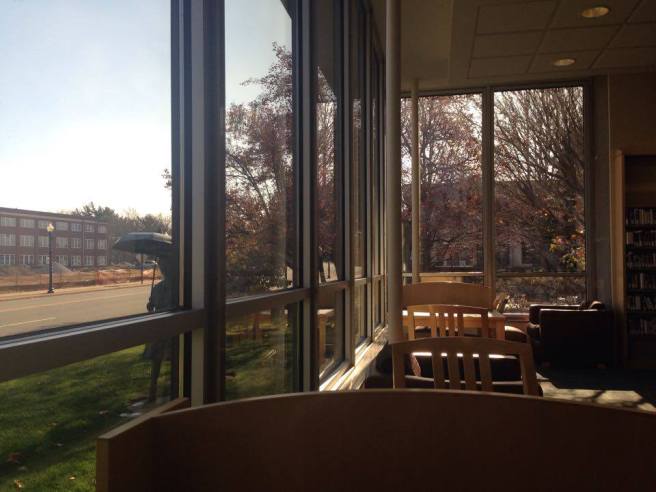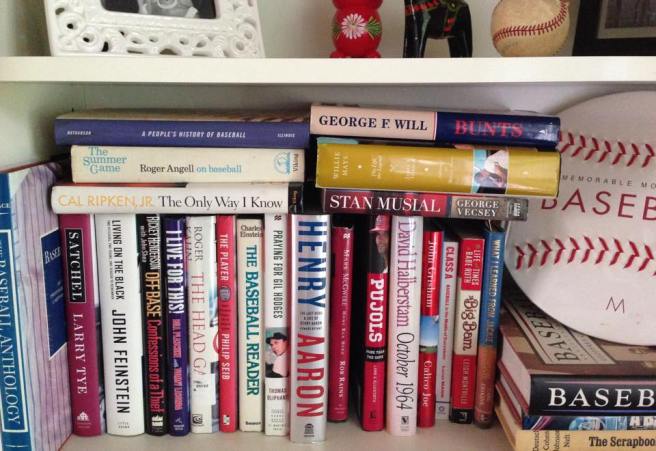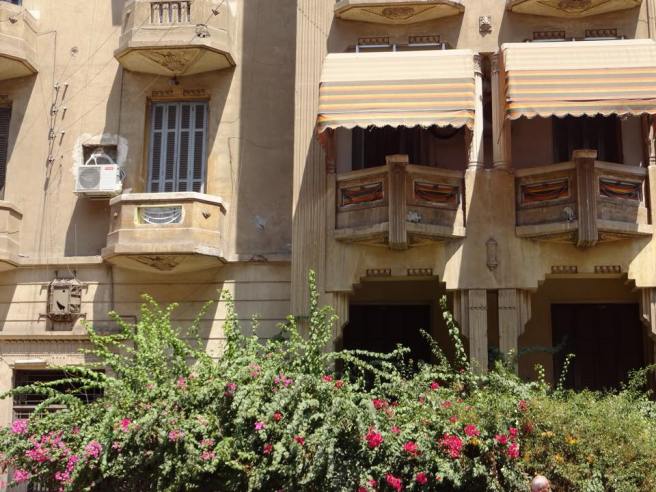
Katie and I went to see Whiskey Tango Foxtrot in an old quiet theater in Waltham. When it finished we drove back to Cleveland Circle, talking about the Noble Savage trope, the Bechdel-Wallace test, what we did and mostly didn’t know about Afghanistan in the first place, what we did and mostly didn’t learn about Afghanistan over the course of the movie, and—more than anything else—in what ways Tina Fey’s character and the nature of the Kabubble felt palpably real to us.
I dropped Katie off and went to Starbucks, where I drank tea with honey and spent twenty minutes trying to journal my reactions into some semblance of articulate thought. Then I got violently sick in the bathroom. I tried to journal a little more but gave up and made it to my car before throwing up again on the side of the road. Eventually I called Katie, who rescued me and drove me back to her apartment, where I spent the night curled around a glass bowl trying to keep a little Powerade down.
Katie, friends, is a saint. This is not the first time I’ve been sick in her apartment. She also hosted me for a feverish week in Cairo last January, in which I seized ownership of her bed, slowly filled it with used tissues, tore through two seasons of Friends on her computer, and effectively crashed her parents’ visit to Egypt. (They were very good-humored about it. Shout-out to the whole Van Zanen clan for saintliness.)
There was something darkly glamorous about being sick in Egypt—and I was, A LOT. Well, the doctor says I have dysentery. I’ve had a lot of trouble keeping weight on here. Yes, I STILL have the cold I got in Qussia three weeks ago; my body just doesn’t seem to shake things off as quickly these days. It was more than just being sick; it was anything that sucked but made a good story. We called it ex-pat chic. Warm your fingers over a candle in your unheated office. Get your backpack stuck in a metro door and hold up the whole train. Inch your way along the shoulder of the road between speeding cars on one side and barbed wire on the other because there’s no sidewalk. Stand for two hours in a crowded, smoky hallway of the federal bureaucracy building waiting for someone to deliver fresh copies of the visa-renewal form ONLY TO FIND OUT THERE ARE EXACTLY ZERO PENS. All very ex-pat chic.
That, though, was the lighter side of things. It also meant rolling your eyes at emails from friends and relatives back home who thought that the slaughter of Copts in Libya jeopardized your safety in Egypt. Yes, Mom, I was on the 26th of July Bridge today but that was HOURS before the bombing and they weren’t targeting civilians anyway—just police—so I don’t get why you’re upset. Bombs go off all the time in my neighborhood, a friend who lived in Giza told me. Just little ones, it’s no big deal. “It was one of those moments when I’ve gotten so used to people with automatic weapons that it didn’t occur to me to get out of the way,” Katie told me once, about tripping over a soldier on a street corner.
Egypt is not Afghanistan; Cairo is not Kabul. But Whiskey Tango Foxtrot isn’t about Afghanistan or Kabul. Seriously. (If it’s supposed to be, it’s a real failure of a film.) It’s Eat Pray Love with bombs—the premise, anyway, if not the conclusion. A woman on an exercise bike in New York realizes all the miles she’s logged there have actually moved the bike backwards; she decides this a metaphor for her life and moves to a place where her life can be dangerous/meaningful. “That’s the most American white-lady story I’ve ever heard,” a woman in Kabul tells her.
….Was that my story?
When I’m being fair to myself: no, not quite. I wound up in Egypt for a whole host of reasons. Some were good.
I’m very American white-lady, however. Whiskey Tango Foxtrot was painful to watch because it was two hours of my impulses, temptations, and dysfunctions writ large and running amok onscreen. Most of them are dormant now that I’m back in the States, but not all of them. Near the end of the film there’s a shot of a man at a party telling the story of how he was kidnapped by terrorists; the dialogue is lost in the music but he’s waving his arms and drinking and laughing and clearly enjoying the chance to be the center of attention.
“Coping mechanism, or blatant dishonest bravado?” I asked Katie after the movie.
“Can people be emotionally honest in that kind of situation?”
I don’t know. The stakes were never ever nearly so high for us, but the underlying question—are we doing injustice to our stories by the way that we tell them?—feels real. Many of my ex-pat chic moments were not glamorous while they were happening. Katie and I traveled from Cairo to Sohag to Luxor once, and while it was, hands down, the craziest two days of my life, I feel queasy whenever I find myself telling it as a wild-badass-hilarious anecdote. I was frightened the whole time.
And the other, bigger, more important thing: ex-pat chic cheapens lives—specifically, non-white, non-ex-pat lives. There’s a sense of desperation in Whiskey Tango Foxtrot that media coverage of the Iraq war is eclipsing the conflict in Afghanistan—but it’s tragic chiefly because it’s bad for the careers of war journalists in Kabul, who can’t get their stories on air, who could get yanked back to the monotony of American life at any time. (The horror.) Any concern for the people of Afghanistan is very, very secondary and very, very implicit. I am guilty of reducing the policeman killed on the 26th of July bridge to a prop in the story of my year abroad. He was a person.
So, another day, another battle with my inner neo-colonialist. It’s too easy to equate exoticism with meaning; it’s wrong, and I need to stop doing it. (And I hate that I’m gendering this—WHY is this so gendered??—but white women in general need to resist narratives about Finding Ourselves overseas, as if the wide dark world exists solely to rejuvenate us. It doesn’t.) It occurred to me, nibbling toast and sipping more Powerade the next morning, that throwing up on the side of the road in Brookline had felt doubly depressing, because it wasn’t a street corner in Zamalek, or Maadi, or Heliopolis. It would’ve made for a better story if I were still in Egypt. But that’s stupid. Puking is puking no matter where you are; it’s not inherently more or less meaningful based on the setting. It’s possible that the narrative power I’ve given to ex-pat chic has undermined my ability to locate meaning in the everyday here. I don’t know how to change that, but I hope that acknowledging it helps.

 my cohort? It’s been a quiet fall for us, with fewer in-person classes and a lot of folks moving on / elsewhere. But this little remnant has come through in big ways. They have been steadily thawing out my hard edges, and now I can dance and cry and even sometimes pray in front of people who were strangers a year ago. I’ve spent the last few years looking for roots. I’m glad to have found some.
my cohort? It’s been a quiet fall for us, with fewer in-person classes and a lot of folks moving on / elsewhere. But this little remnant has come through in big ways. They have been steadily thawing out my hard edges, and now I can dance and cry and even sometimes pray in front of people who were strangers a year ago. I’ve spent the last few years looking for roots. I’m glad to have found some.
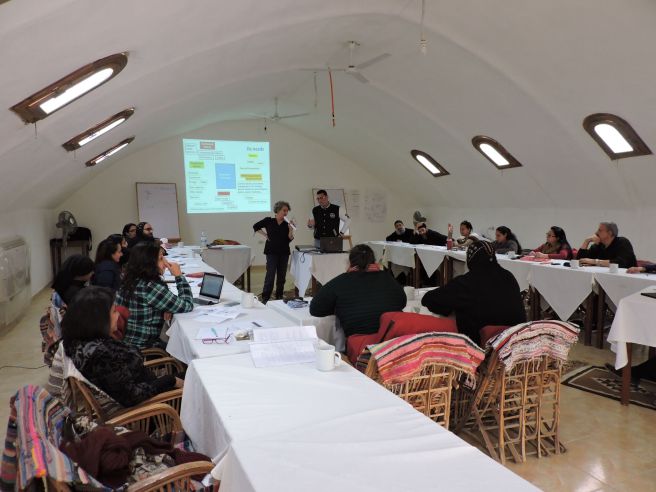
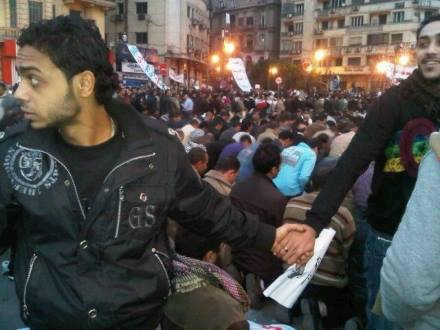
 As Westerners, we’ve got to expand our thinking so that by affirming their Christianity, we don’t deny Middle Eastern Christians their other identities. In Intersectionality, Patricia Hill Collins argues that relational thinking helps us move from either/or binaries into a both/and framework–one which is desperately needed here. Copts, for example, are fully Christian and fully Egyptian. Chaldean Christians are not believers who incidentally happen to live in Iraq; they share geographical and national identities with the Muslims who are targeted by the ban.
As Westerners, we’ve got to expand our thinking so that by affirming their Christianity, we don’t deny Middle Eastern Christians their other identities. In Intersectionality, Patricia Hill Collins argues that relational thinking helps us move from either/or binaries into a both/and framework–one which is desperately needed here. Copts, for example, are fully Christian and fully Egyptian. Chaldean Christians are not believers who incidentally happen to live in Iraq; they share geographical and national identities with the Muslims who are targeted by the ban.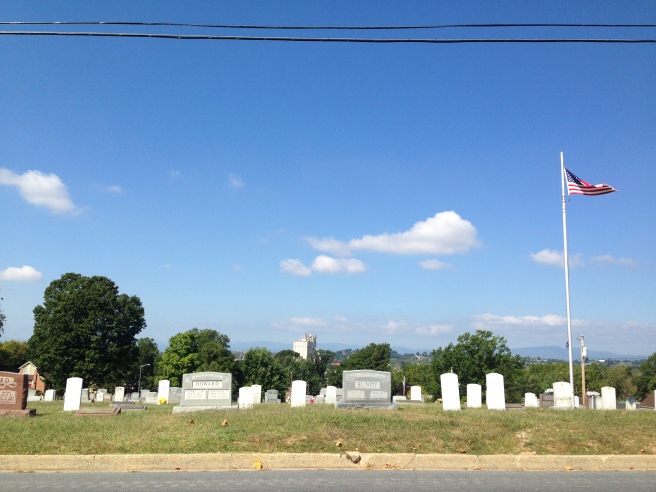
 I’ve had a measly attitude about living in the south so far. Everything is named after Robert E. Lee, half the customized plates at the DMV are geared towards gun ownership, and worst of all, people emphatically do not act like the curmudgeonly New Englanders I’ve come to know and love. (And maybe emulate? Strangers here are friendly, and I am now suddenly a person who does not trust that.)
I’ve had a measly attitude about living in the south so far. Everything is named after Robert E. Lee, half the customized plates at the DMV are geared towards gun ownership, and worst of all, people emphatically do not act like the curmudgeonly New Englanders I’ve come to know and love. (And maybe emulate? Strangers here are friendly, and I am now suddenly a person who does not trust that.)


